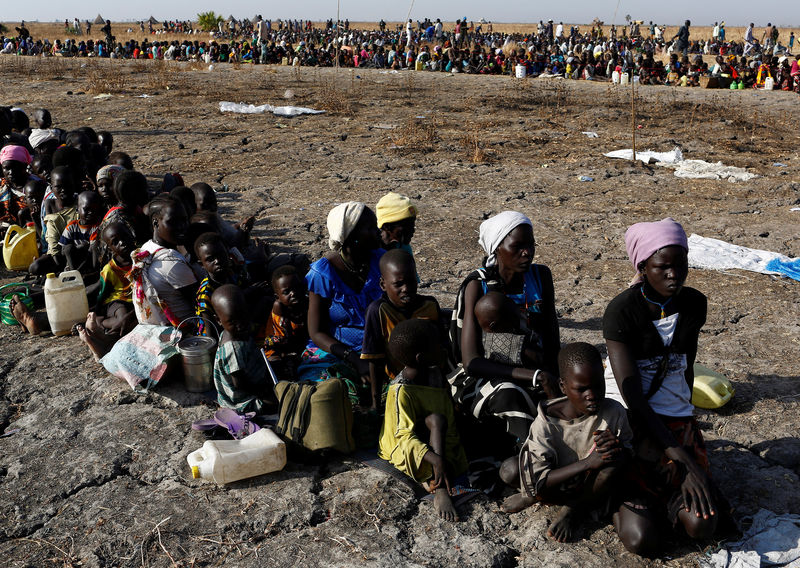THONYOR, South Sudan (Reuters) - Like thousands of other South Sudanese families caught up in famine, Sara Dit and her 10 children are hiding from marauding gunmen in the swamps and islands of the river Nile.
The refuge has a steep price: families cannot farm crops or earn money to buy food. They eat water lily roots and the occasional fish. Dit's family have not eaten for days.
Last week the United Nations declared that parts of South Sudan are experiencing famine, the first time the world has faced such a catastrophe in six years. Some 5.5 million people, nearly half the population, will not have a reliable source of food by July.
The disaster is largely man-made. Oil-rich South Sudan, the world's youngest nation, plunged into civil war in 2013, after President Salva Kiir fired his deputy Riek Machar. Since then, fighting has fractured the country along ethnic lines, inflation topped 800 percent last year and war and drought have paralyzed agriculture.
Dit and her children are among more than 100,000 people that the United Nations says face imminent starvation in the counties of Leer and Mayendit in greater Unity state, which borders Sudan.
"The children are sick but what can I do? There are no hospitals near us and we can't move far from where we are hiding. My older children go fishing but we can't get enough because we don't have tools," Dit told Reuters on Saturday, cradling her four-year-old son in a temporary nutrition clinic set up by UNICEF, the U.N. agency dedicated to children.
Staff said her son will die without immediate help.
Nyaluat Chol, a mother of six, said her family had survived on water lilies and palm fruit for the past year.
"We have been running from fighting for a long time. We settled in the island because it's much better there. But we can't leave to go buy food. We eat the weeds floating on the river, sometimes we get fish," the 31-year-old said.
The women were among a crowd of 20,000 people that emerged from the swamps and assembled at the rebel-held village of Thonyor, in Leer county, when they heard the United Nations was registering people for emergency rations.
Some families received fishing nets and rods from aid workers to keep them going until food arrived.
It was the U.N.'s first trip to Thonyor in a year. Many parts of the country are inaccessible due to fighting. Others are just very remote. South Sudan, the size of Texas, has only 200 km (120 miles) of paved roads, nearly six years after independence from neighboring Sudan.
"What we've seen is a lot of people coming from the islands," said George Fominyen, a spokesman for the World Food Programme. "They have been living on water lilies, they have been living on roots, from weeds in the Nile, at most they eat once in a day."
County commissioner Majiel Nhial said when villagers received food aid last year, they were attacked. Men in uniform looted and burnt their homes, he said.

"We lost all our properties, cows and our houses were looted. We were attacked, women were raped and girls abducted," he said.